As the world teeters closer to the brink of nuclear war, the Centers for Disease Control and Prevention holds a briefing today on how the public can prepare for a nuclear bomb.
It’s duck and cover deja vu all over again.
On the heels of the recent disastrous ballistic missile false alarm in Hawaii where Google searches on “how to survive a nuclear attack” spiked dramatically, the advice couldn’t come any quicker.
The somber announcement by the CDC came coincidentally right after the ominously named “Bomb Cyclone” winter storm hit the East Coast, assuring the public they wanted to prepare us for a nuclear winter.
The CDC has gotten into the Civil Defense business taking a familiar stance on “preparedness,” a word all to familiar to baby boomers when it was bandied about in the 1950’s and ’60’s to calm our nuclear jitters.
You would survive if you prepared.
Let’s hope today’s advice is a bit more practical than the one Civil Defense put forth in the Cold War.
Doctors Orders
Not unlike today, the mid-century medical community got involved in offering safety tips to prepare in the event of an atomic attack.
Flipping through a 1950’s medical guide I noticed an entire chapter was devoted to the subject.
The bulky tome from 1951 entitled The Pictorial Medical Guide published by Progress Research Corporation was written by a team of esteemed doctors and in those days your doctors word was as good as Uncle Sams. The guide seemed geared to women readers offering to “provide the woman of today with sound and authoritative counsel to give her care and cultivation of a healthy body and the conduct of a happy life.”
Including surviving an Atomic Bomb.
Placed logically in the chapter labeled “Relief From Nervous Tension “ was a photo essay offering simple and easy to follow instruction for beating the Bomb.
Nervousness seemed to plague this age of anxiety and for good reason. Americans had a good case of the nuclear jitters where the prospect of a nuclear war between Russia and the U.S. seemed inevitable.
The book points out “that civilized living breeds nervousness because we live in a state of turmoil often by trying to keep up with the Joneses.” In an age where the arms race was on full tilt with the Soviets we were more likely edgy from keeping up with the Ivanov’s more than the Joneses.
But by following these sound and simple suggestions, your chances were pretty good on surviving; in fact they were pretty darn good.
Relax and Prepare
Your chances of escaping alive if you are in the area where an atomic bomb explodes are better than is commonly believed,” they offer reassuringly.” A person one half to one mile away has a 50 -50 chance. Beyond 2 miles, the explosion will cause almost no deaths.
Much depends on whether or not your shelter is adequate. Concrete buildings with heavy steel frames are much safer than frame houses. Over all half bomb injures are the result of being tossed about or struck by falling and flying objects.”
Surviving an Atomic Attack
In the Basement– When sirens sounds, turn off all utilities close doors and windows draw curtains and blinds and take shelter in your basement.
Get Under the Table– Hide under a table to protect yourself against falling plaster and flying objects. Bury your face in arms.
Hide in a Doorway -Try to shield yourself if caught unexpectedly out of doors. A deeply recessed doorway gives good protection. Prevent flash burns by shielding your face and eyes.
Against the Curb – By dropping flat against the curb with the face toward it you are less likely to be tossed about or hit by debris.
Simple Precautions That Save Lives– At the time of an atomic bomb attack if there is no other shelter available crouch behind a tree for protection. Turn away from the blast and cover exposed skin by pulling your coat over your head. (Below) Mother caught out of doors with a baby carriage should dash into doorway, cover herself and baby with blanket.
How to Keep out Radioactive Dust– After a blast, you must take precautions to keep out radioactive dust or fog. Doors and windows should be kept closed. Cover over your fireplace.
Care of Injured– unskilled handling of injured persons is dangerous. Remove an injured person from scene of the fire only to save his life. otherwise wait for a physician to arrive.
Dust is Dangerous – If you find yourself in a contaminated area where there are clouds of dust or spray ( possibly radioactive) keep your mouth and nostrils covered with a handkerchief until you reach safety.
Scrub After Exposure-After a blast a good scrubbing will remove radioactive particles that may be clinging to the skin. Put on clean uncontaminated clothes.
Bury Clothes– Clothing that you have worn when exposed in a contaminated area may be dangerous. It is best to bury it-taking adequate precautions while you do.
Copyright (©) 2018 Sally Edelstein






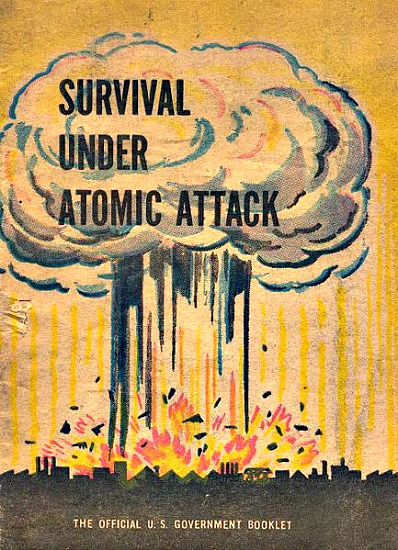
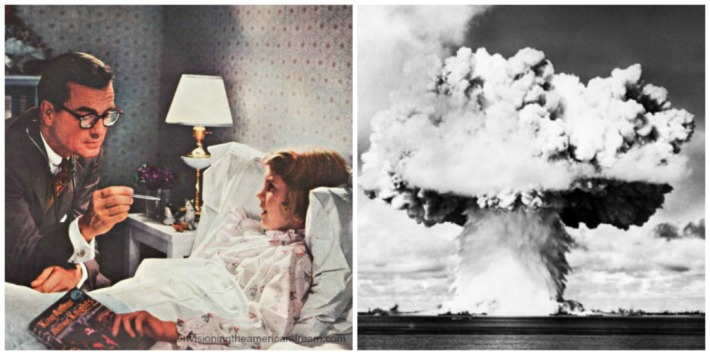
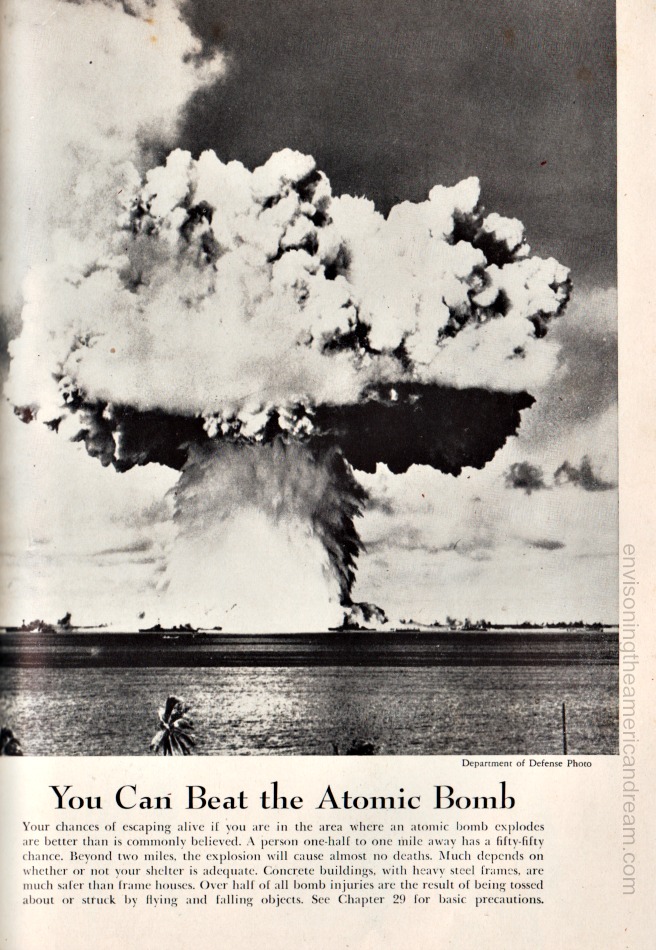
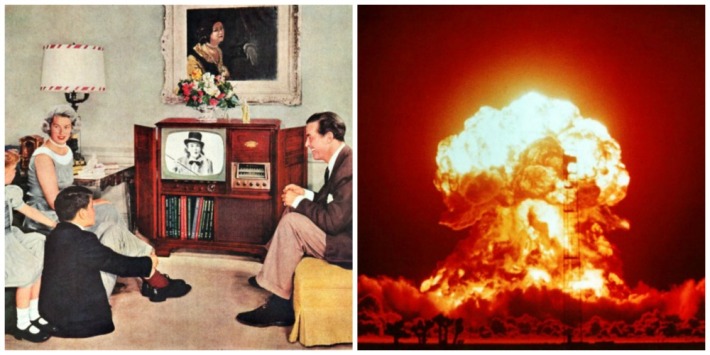
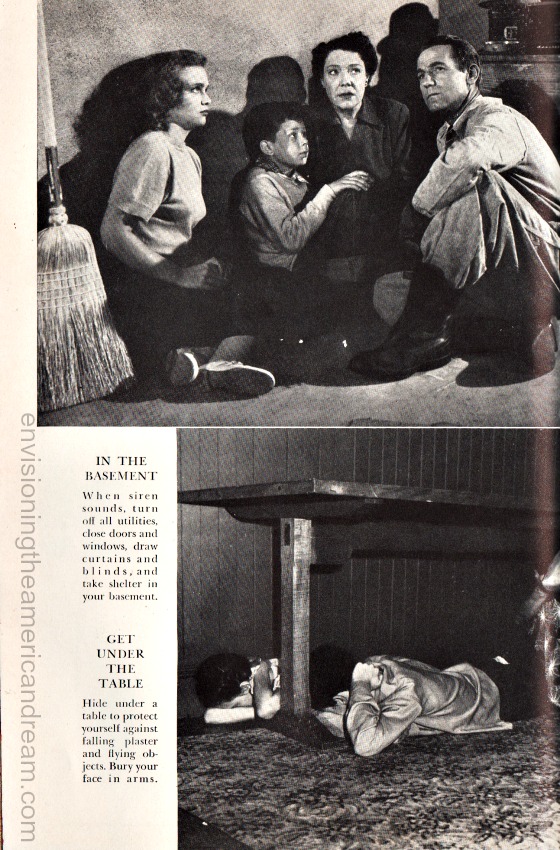
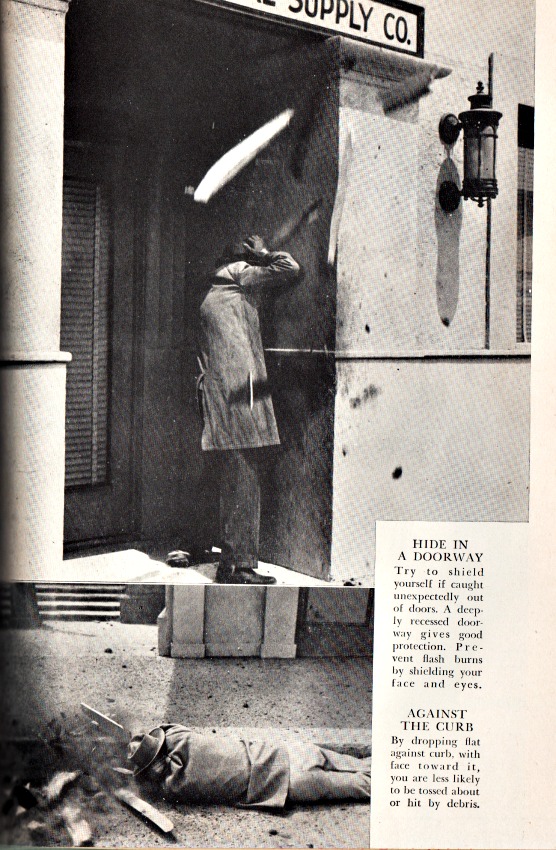
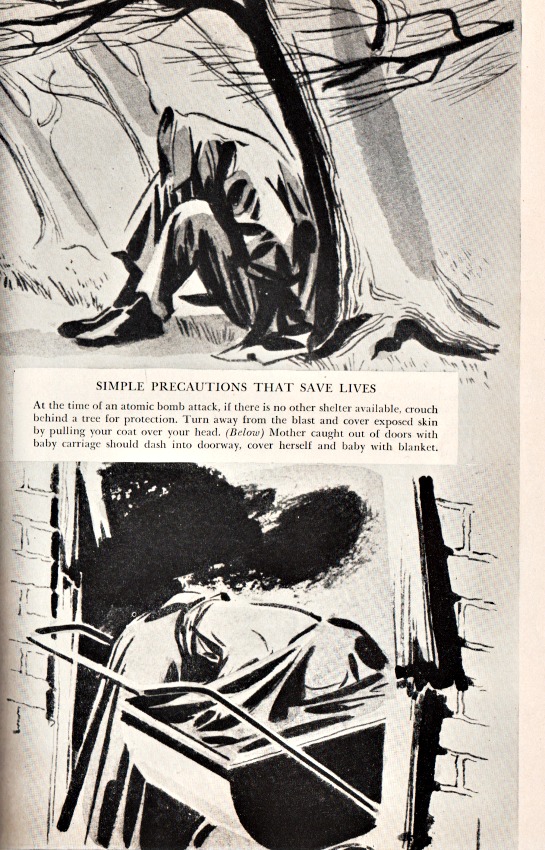
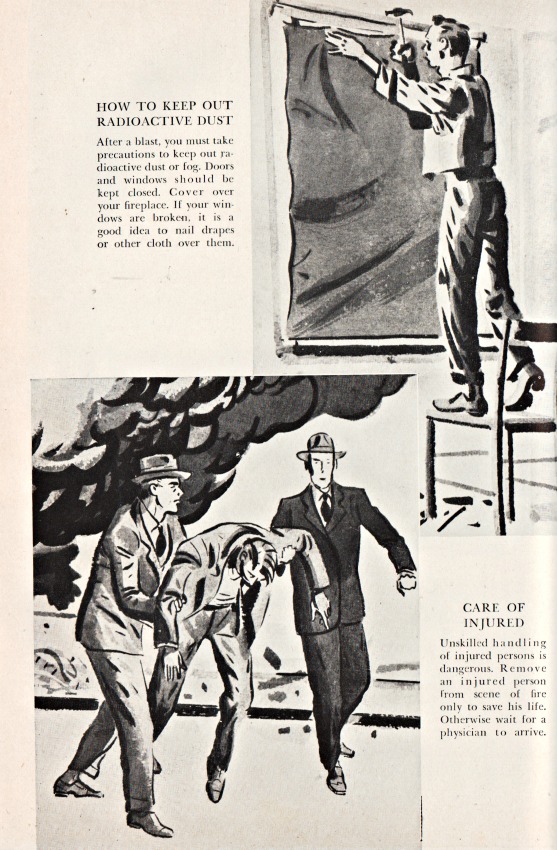
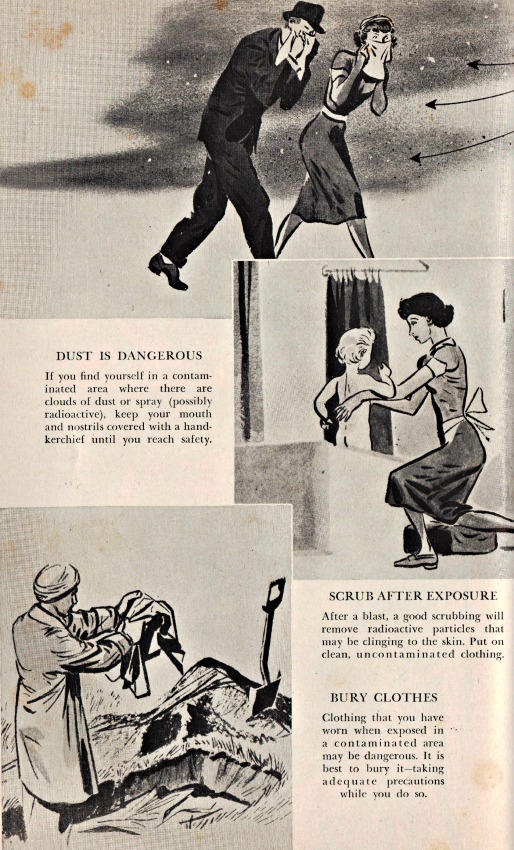

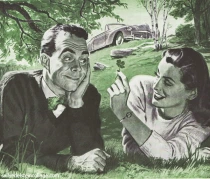


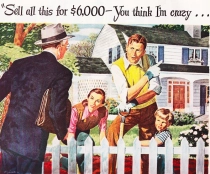
Oh my! If a nuclear bomb is heading my way, I shall fervently hope I have that handy doorway to duck into. Growing up in the 50s, I do remember “duck and giver drills” is school. But I also remember a chilling (weren’t they all!) Twilight Zone episode where one family in the neighborhood build themselves a backyard bomb shelter. Then a Hawaii-type siren went off and everyone ran to this one shelter. The owners turned them away. Not enough space. But the real drama came when it was discovered to be a false alarm. And he’d have to live among these people again.
Your nostalgia items could be amusing if this weren’t such a serious topic. I enjoyed seeing them though, recalling again how valiantly my government liked to keep its people calm.
LikeLiked by 1 person
That is a classic Twilight Zone episode that dealt with a real life moral dilemma of whether to allow neighbors into your fall out shelter or just take care of your own. It was the stuff of many a church sermon during that time period and was a moral dilemma.
LikeLiked by 1 person
Yes, the episode was the 3rd year, third episode titled “The Shelter” first shown on Sept 29, 1963. Actually, it’s quite tame compared to reality, no handguns or cursing; and the neighbors even offer to fix up the mess they made ‘crashing Bill’s party’.
LikeLiked by 1 person
World leaders should be forced to watch the film “The Day After” (1983) because my Ikea table sure isn’t build like the one in your photo!
LikeLiked by 2 people
I think its safe to say that even if you were able to survive a nuclear attack, you wouldn’t really want to.Life as we know it would exist no more.
LikeLiked by 1 person
Who carries a handkerchief any more? Will an extra layer or two of Kleenex protect me from nuclear fallout?
LikeLiked by 2 people
No more than a thin layer of embroidered linen would
LikeLiked by 1 person
Like anything else that can kill you, PREVENTION IS BEST.
LikeLiked by 2 people
We remember the drills all to well. From a report by U.S. Arms Control and Disarmament Agency 1975. “Plutonium-239 has a half-life of 24,000 years, strontium-90 with a half-life of 28 years, cesium-137 – half-life of 30 years and thankfully iodine-131 only has a half-life of only 8 days. Radiaton damage would cause leukemia, cancers of the thyroid, lung, breast, bone, genetic damage, birth defects along with gastrointestinal tract damage and more.”
An all out nuclear exchange would destroy hospitals and render emergency vehicles non-functioning. Every form of communication would not work due to the electro-magnetic blast. The best way to survive is to never play the game.
LikeLiked by 2 people
The very notion of “surviving” a nuclear attack is an oxymoron. And frankly anyone who doesnt believe that is …well… a moron.
LikeLiked by 1 person
Here is the episode of The Twilight Zone The Shelter http://www.dailymotion.com/video/x4y1ga9
LikeLiked by 1 person
Reblogged this on sixdegreesofstoogeration and commented:
I watched “Duck and Cover” and many, many, MANY!!!! “Nuclear Attack Survival Tips” 2 weeks ago. Who would’ve known that all that I learned would be so “useful?”
Yes, I am being sarcastic…
LikeLike